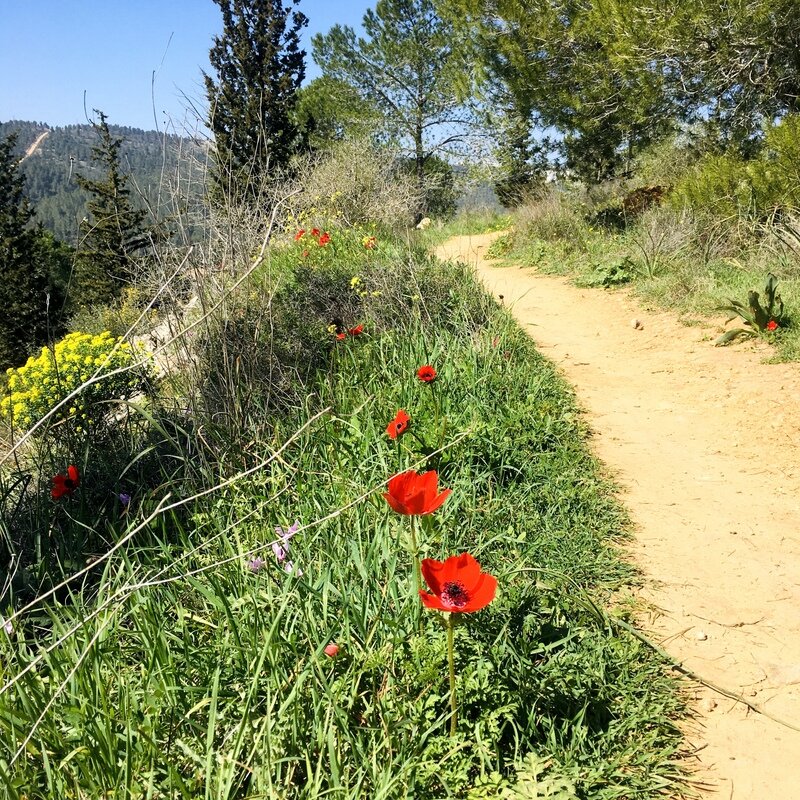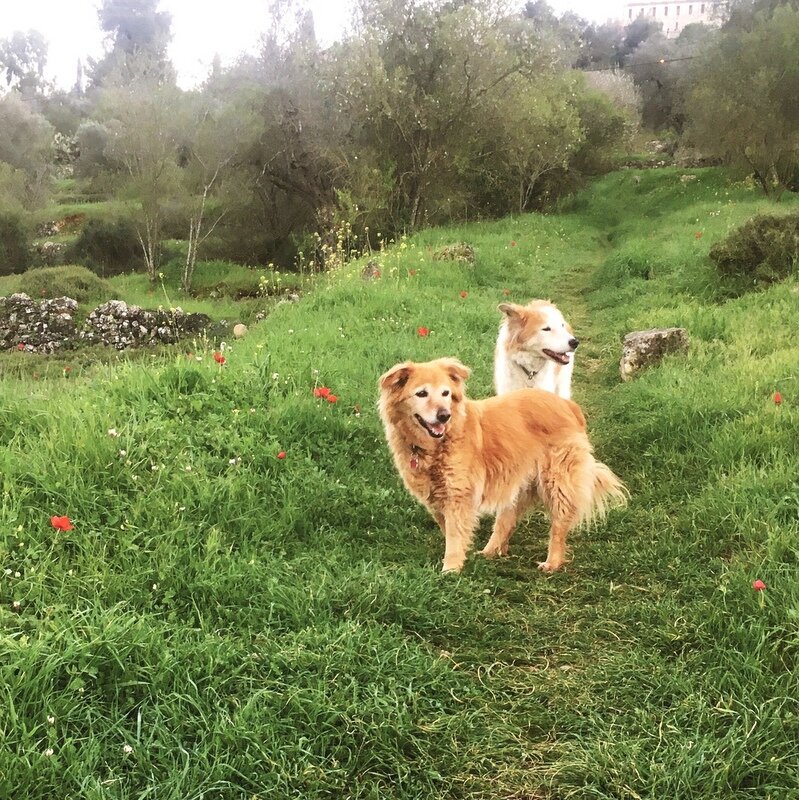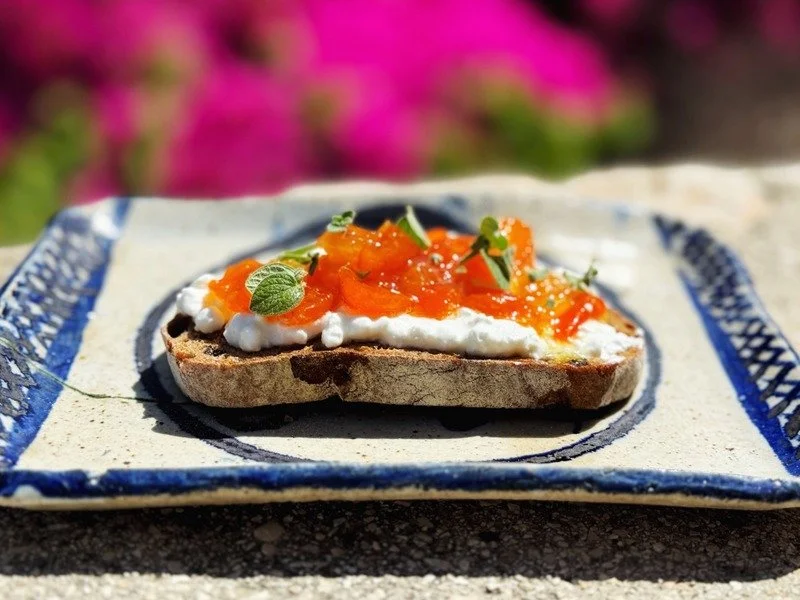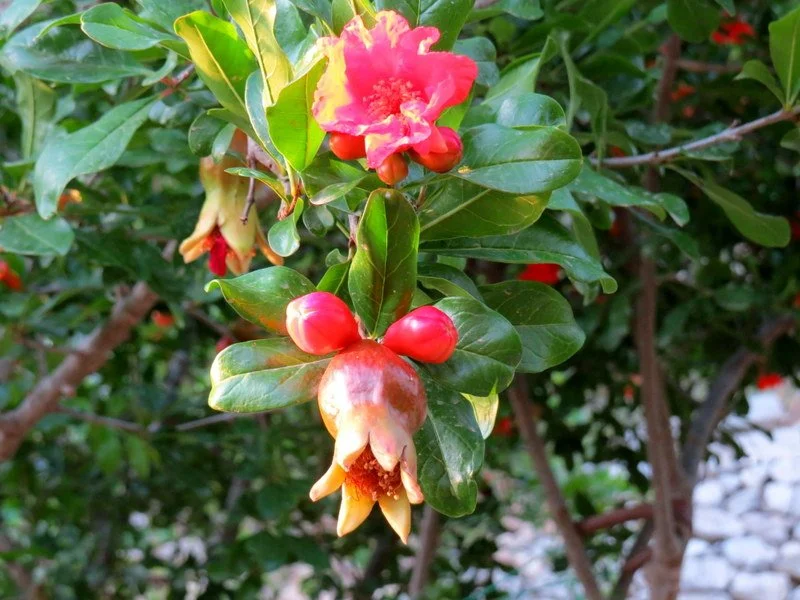1 year ago Earl Grey Cake / 3 years ago Mediterranean Fish Stew
CHANGES
Winter is turning into Spring and in Israel, Covid-19 is being conquered by a concerted vaccine drive (vaccine fever!) that’s seen more than half the population here innoculated and illness and hospitalization rates fall… As restaurants and shops re-open, solitary pursuits are no longer required, though old dogs can enjoy a spring evening surrounded by spring flowers and olive trees.
This has been been a tumultuous time for Just Add Love, as our Facebook page was caught up in the dispute between Facebook and the Australian government. So this is a recovery story, and today’s recipe for Mediterranean stuffed vegetables, a delectable vegan dish, is part of the tale.
2 dishes of vegetables including zucchini, peppers and tomatoes in a dish waiting to be baked. Stuffing is vegan.
When I tried to post this lovely vegan recipe on our Just Add Love FB page last month, I found I couldn’t. It wouldn’t let me. When I looked more closely, the page was empty. “No posts yet” it said blandly at the top of a page which I have been tending to, posting articles and photos, curating, commenting, asking, and telling since 2015.
There was no word of any kind from FB. No warning, no do you want to save your material – you just wake up one morning to find that 7 years of posts, photos and comments from your community have simply disappeared.
I did wonder if it was related to the FB ban on Australian news sites, but decided that it was unlikely since Just Add Love is focused on food and history. But once I saw the range of sites which had also had their material swallowed up – zhwoop – I realised that it was probably it. But still no word either way from FB.
I emailed them, confirming that Just Add Love wasn’t actually a news site – after all, WW2 was a while ago now - and expressing disbelief that Facebook was removing all Australian information pages in this fashion.
They replied the next morning – a sign they were nervous, since left to themselves, they rarely reply to anyone. They said it should all be restored within a few days and suggested I pay them some money to advertise my page when it returned – oh, really?
All this came hot on the heels of a previous FB drama where I was locked out of the page and couldn’t post anything. Initially, we thought we might have been hacked, but it turned out to be some internal bureaucratic FB error – which we had to solve by ourselves. I wrote to them every day for weeks, but there was no reply … I was still traumatized from that shouting into the void when the entire FB page disappeared, on purpose this time.
Although everything has now come back, twice, and I celebrated by baking fab spicy (dairy free!) ginger biscuits, this platform is starting to feel pretty shaky. Perhaps it’s time to accept that you can’t build a house on someone else’s land – and figure out another social media solution?
I would love suggestions from you about an alternate friendlier social media spot.
Phots shows ginger biscuits stacked on a turquoise plate, photo outdoors.
LOVE AND LIGHT
One of the last thhings I posted on the FB page before it 'disappeared’ was this extraordinary story, that took place in New York not long after WW2. You will need to sit down and exhale reading it.
It features coincidence and good fortune - so much appreciated when they appear in the lives of Holocaust survivors - beautifully told by American writer and journalist Paul Deutschman. (You will see why I had to look him up immediately after reading this.)
It was featured in Great Stories Remembered, compiled by Joe L. Wheeler.
GOD APPEARS IN THE BROOKLYN SUBWAY
Marcel Sternberger was a methodical man of nearly 50, with bushy white hair, guileless brown eyes, and the bouncing enthusiasm of a czardas dancer of his native Hungary. He always took the 9:09 Long Island Railroad train from his suburban home to Woodside, NY, where he caught a subway into the city.
New York elevated train, black and white photo, 1940s copyright Getty images.
On the morning of January 10, 1948, Sternberger boarded the 9:09 as usual. En route, he suddenly decided to visit Laszlo Victor, a Hungarian friend who lived in Brooklyn who was ill.
Accordingly, at Ozone Park, Sternberger changed to the subway for Brooklyn, went to his friend’s house, and stayed until midafternoon. He then boarded a Manhattan-bound subway for his Fifth Avenue office. Here is Marcel’s incredible story:
“The car was crowded, and there seemed to be no chance of a seat. But just as I entered, a man sitting by the door suddenly jumped up to leave, and I slipped into the empty place. I’ve been living in New York long enough not to start conversations with strangers. But being a photographer, I have the peculiar habit of analyzing people’s faces, and I was struck by the features of the passenger on my left. He was probably in his late 30s, and when he glanced up, his eyes seemed to have a hurt expression in them. He was reading a Hungarian-language newspaper, and something prompted me to say in Hungarian, “I hope you don’t mind if I glance at your paper.”
The man seemed surprised to be addressed in his native language. But he answered politely, “You may read it now. I’ll have time later on.”
During the half-hour ride to town, we had quite a conversation. He said his name was Bela Paskin. A law student when World War II started, he had been put into a German labor battalion and sent to the Ukraine. Later he was captured by the Russians and put to work burying the German dead. After the war, he covered hundreds of miles on foot until he reached his home in Debrecen, a large city in eastern Hungary.
I myself knew Debrecen quite well, and we talked about it for a while. Then he told me the rest of his story. When he went to the apartment once occupied by his father, mother, brothers and sisters, he found strangers living there. Then he went upstairs to the apartment that he and his wife once had. It also was occupied by strangers. None of them had ever heard of his family.
As he was leaving, full of sadness, a boy ran after him, calling “Paskin bacsi! Paskin bacsi!” That means “Uncle Paskin.” The child was the son of some old neighbors of his. He went to the boy’s home and talked to his parents. “Your whole family is dead,” they told him. “The Nazis took them and your wife to Auschwitz.”
Auschwitz was one of the worst Nazi concentration camps. Paskin gave up all hope. A few days later, too heartsick to remain any longer in Hungary, he set out again on foot, stealing across border after border until he reached Paris. He managed to immigrate to the United States in October 1947, just three months before I met him.
Men reading newspapers on the subway, New York, 1940s.
All the time he had been talking, I kept thinking that somehow his story seemed familiar. A young woman whom I had met recently at the home of friends had also been from Debrecen; she had been sent to Auschwitz; from there she had been transferred to work in a German munitions factory. Her relatives had been killed in the gas chambers. Later she was liberated by the Americans and was brought here in the first boatload of displaced persons in 1946.
Her story had moved me so much that I had written down her address and phone number, intending to invite her to meet my family and thus help relieve the terrible emptiness in her life.
It seemed impossible that there could be any connection between these two people, but as I neared my station, I fumbled anxiously in my address book. I asked in what I hoped was a casual voice, “Was your wife’s name Marya?”
He turned pale. “Yes!” he answered. “How did you know?”
He looked as if he were about to faint.
I said, “Let’s get off the train.” I took him by the arm at the next station and led him to a phone booth. He stood there like a man in a trance while I dialed her phone number.
It seemed hours before Marya Paskin answered. (Later I learned her room was alongside the telephone, but she was in the habit of never answering it because she had so few friends and the calls were always for someone else. This time, however, there was no one else at home and, after letting it ring for a while, she responded.)
When I heard her voice at last, I told her who I was and asked her to describe her husband. She seemed surprised at the question, but gave me a description. Then I asked her where she had lived in Debrecen, and she told me the address.
Asking her to hold the line, I turned to Paskin and said, “Did you and your wife live on such-and-such a street?”
“Yes!” Bela exclaimed. He was white as a sheet and trembling.
“Try to be calm,” I urged him. “Something miraculous is about to happen to you. Here, take this telephone and talk to your wife!”
He nodded his head in mute bewilderment, his eyes bright with tears. He took the receiver, listened a moment to his wife’s voice, then suddenly cried, “This is Bela! This is Bela!” and he began to mumble hysterically. Seeing that the poor fellow was so excited he couldn’t talk coherently, I took the receiver from his shaking hands.
“Stay where you are,” I told Marya, who also sounded hysterical. “I am sending your husband to you. We will be there in a few minutes.”
Bela was crying like a baby and saying over and over again. “It is my wife. I go to my wife!”
At first, I thought I had better accompany Paskin, lest the man should faint from excitement, but I decided that this was a moment in which no strangers should intrude. Putting Paskin into a taxicab, I directed the driver to take him to Marya’s address, paid the fare, and said goodbye.
Bela Paskin’s reunion with his wife was a moment so poignant, so electric with suddenly released emotion, that afterward neither he nor Marya could recall much about it.
“I remember only that when I left the phone, I walked to the mirror, like in a dream, to see if maybe my hair had turned gray,” she said later. “The next thing I know, a taxi stops in front of the house, and it is my husband who comes toward me. Details I cannot remember; only this I know—that I was happy for the first time in many years.....
“Even now it is difficult to believe that it happened. We have both suffered so much; I have almost lost the capability to not be afraid. Each time my husband goes from the house, I say to myself, “Will anything happen to take him from me again?”
Her husband is confident that no horrible misfortune will ever again befall them. “Providence has brought us together,” he says simply. “It was meant to be.”
Sceptical persons will no doubt attribute the events of that memorable afternoon to mere chance. But was it chance that made Marcel Sternberger suddenly decide to visit his sick friend and hence take a subway line that he had never ridden before? Was it chance that caused the man sitting by the door of the car to rush out just as Sternberger came in? Was it chance that caused Bela Paskin to be sitting beside Sternberger, reading a Hungarian newspaper?”
RECIPE
Vegetables stuffed with rice and meat – memulaim in Hebrew – are a staple across the Mediterranean. This is a vegan version where roast veges are combined with savoury rice flavoured with cinnamon, cloves and lots of green herbs - delicious on its own - and then stuffed into vegetables and baked in a tomato sauce.
It’s a Greek recipe, which Australian-Greek cook Anna Kostantinidis posted on a FB food site just before FB froze us all out! It’s what I was trying to post when the FB ban went into effect.
NOTE: This recipe makes a lot of stuffing, but as it’s the best vegan stuffing I’ve ever had, that’s not a problem! In fact, I could eat this stuffing on its own every night. The original recipe called for rice, but as I didn’t have any at home, I used burghul instead and love it with that.
Yemista - Greek stuffed vegetables
INGREDIENTS
Stuffing
1 large eggplant,
1 large onion, cut into large dice
2 small zucchinis
1 red capsicum
2 teaspoons dried oregano
salt to taste
¼ cup olive oil
Vegetables for dish
4 large capsicums
3 thick green zucchinis
2- 3 large ripe tomatoes
3 large potatoes – cut into long wedges
1 teaspoon dried oregano
10 dessert spoons long grain rice (worked out as 1 dessert spoon for every vegetable you have to stuff plus one more for good measure.)
1 onion, finely diced
2 vegetable stock cubes dissolved in 3 cups / 750 ml boiling water
1 litre tomato passata or 2 large tins chopped tomatoes
1½ cups water
2 cups of freshly chopped herbs - mint, continental parsley, coriander, basil or dill
½ cup olive oil
Spices
1 teaspoon ground cinnamon
½ teaspoon ground cloves
salt and pepper
METHOD
1. Pre-heat the oven to 180 C / 350 F. Prepare a large oven tray with baking paper for the stuffing and set aside. Prepare a large tray or dish for the main dish by coating in olive oil. (Or you can re-use the first oven tray, if it’s the right size, which I did the second time!)
2. Chop all the vegetables for the stuffing. You want them in small chunks about 1 cm / ½ inch in size. Combine in a bowl, pour over ¼ cup olive oil and the salt, place on the tray and spread out evenly. Bake for 25-30 mins, turning vegetables over once approx. 15 mins into cooking and continue cooking until soft and lightly coloured.
3. While that’s baking, slice the tops off of the tomatoes, zucchinis and capsicums and set aside. Scoop the seeds out of the capsicums and discard. Remove the pulp from the zucchinis and tomato, set aside. This is the most time-consuming part of the job, especially clearing out the zucchini and leaving a nice ‘shell’ to stuff later. A spoon combined with a knife will do the trick, or a special tool which I have from a food story I did in the Galillee in northern Israel.
4. Heat ¼ cup of olive oil in a frying pan and sauté the remaining chopped onion until soft. Add all of the rice, mix well, then add the pulp from the zucchinis and tomato, continue to cook until the zucchini has softened, 3-5 minutes, then add the vegetable stock and 600ml of the tomato puree. Continue to cook the mixture until most of the liquid has been absorbed, but it’s not completely dry.
5. In a large bowl combine the rice with the roasted vegetables the chopped fresh herbs, the ground cinnamon, cloves and salt to taste. Adjust all of your seasonings at this point. This dish requires heavy seasoning before baking.
6. Stuff the prepared tomatoes zucchini and capsicums with the rice/vege mixture until three-quarters full. Arrange the vegetables in the baking tray and put back the tops which you set aside.
7. Place the potato wedges in a bowl, coat with ¼ cup olive oil, the oregano, and the remainder of the tomato passata, along with the water. Wedge the potatoes between the vegetables and pour the remainder of the liquid over the dish. Tightly cover the dish with foil and bake for 1 hour. Remove the foil, add more water if the pan seems dry, and continue baking until the vegetables have a nice colour and the potatoes are cooked through around 35 mins.
8. Serve with feta cheese and crusty bread.
FEEDBACK
Personally, I didn’t feel the potatoes added much and might give them a miss next time. (I anticipate horrified reactions from Greek cooks.) I also didn’t serve with bread and cheese.
The spicing is heavenly and the whole dish is super tasty. It is time-consuming, lots of chopping and prepping veges, but definitely worth it! Or you can do what I’ve done twice since and just make the stuffing and eat that for dinner :-)
JUST ADD LOVE
It’s always good to end with good news. Our wonderful book Just Add Love is basically sold out, we are down to our last 20 or so. If you want a copy, or a second copy for a gift, order quickly here on this website. Wait, that’s not the good news! The good news is that we are now starting to work on our e-book, and hoping it won’t take too long before that’s available all over the world.
I may not get the chance to post again soon, since Israel’s election takes place next week and a reporter’s work is never done, so I’m taking this opportunity to wish you all a Happy Passover and a Happy Easter. I love these spring festivals and I hope it’s the start of putting the coronavirus behind us and returning, “from slavery to freedom’, to a more normal life.





















